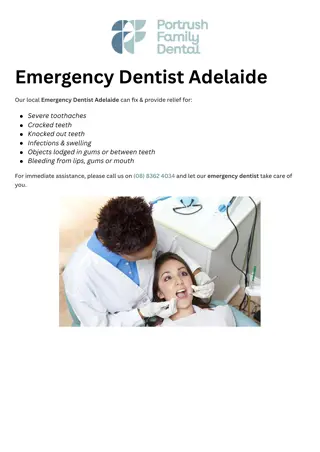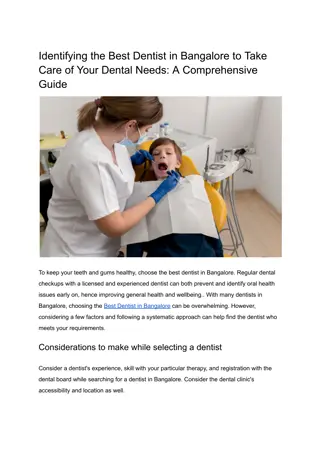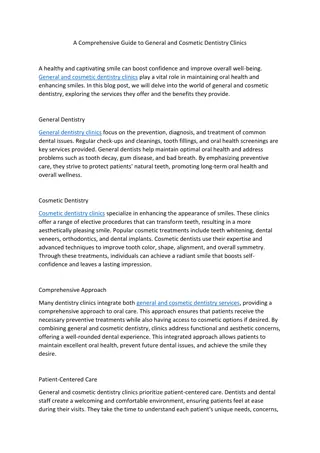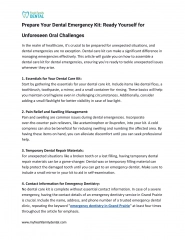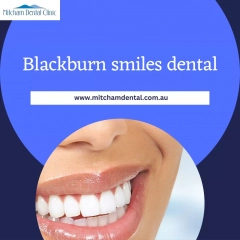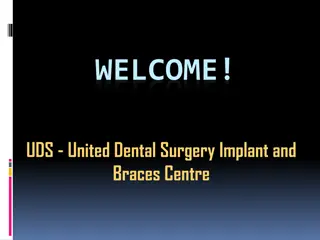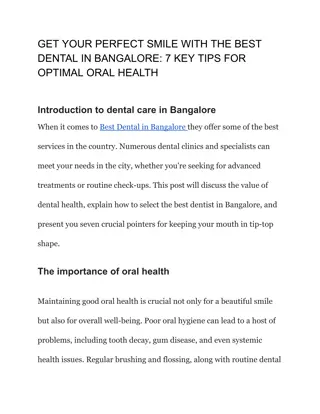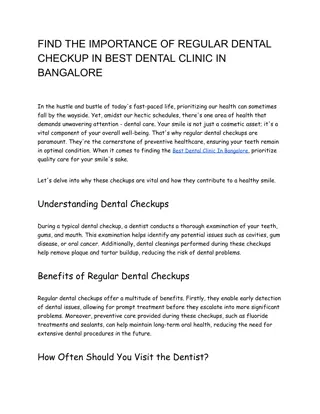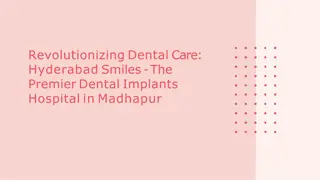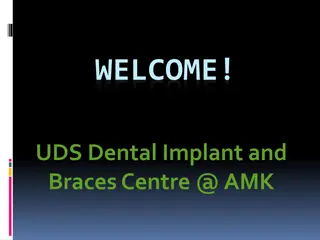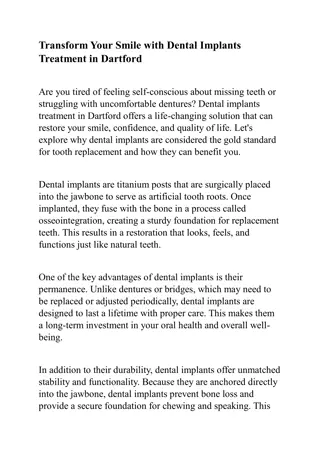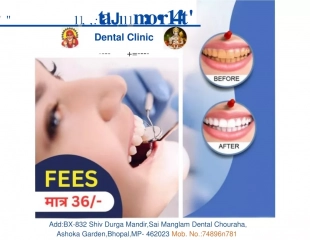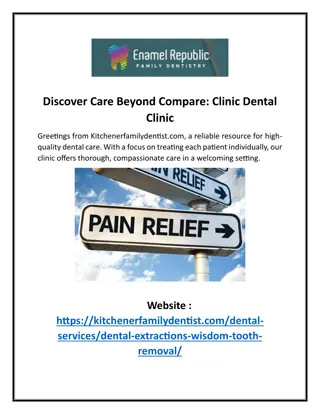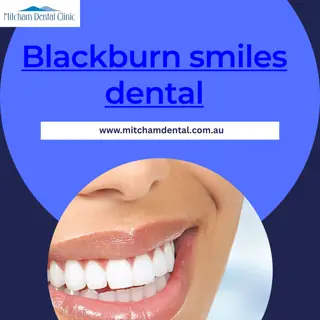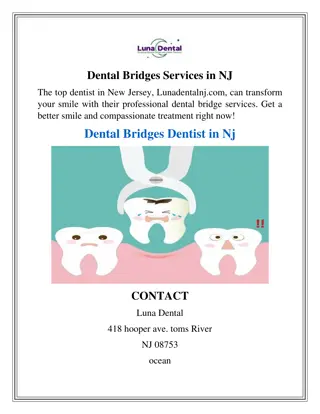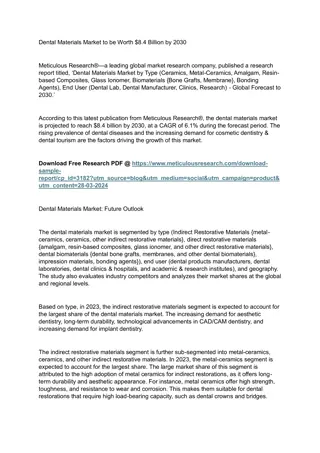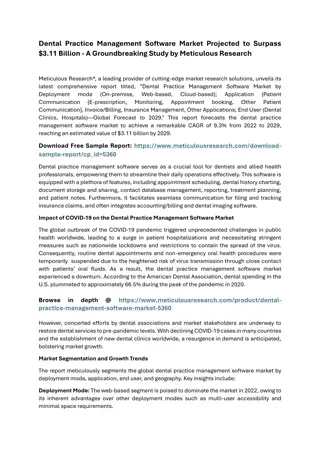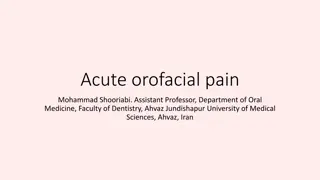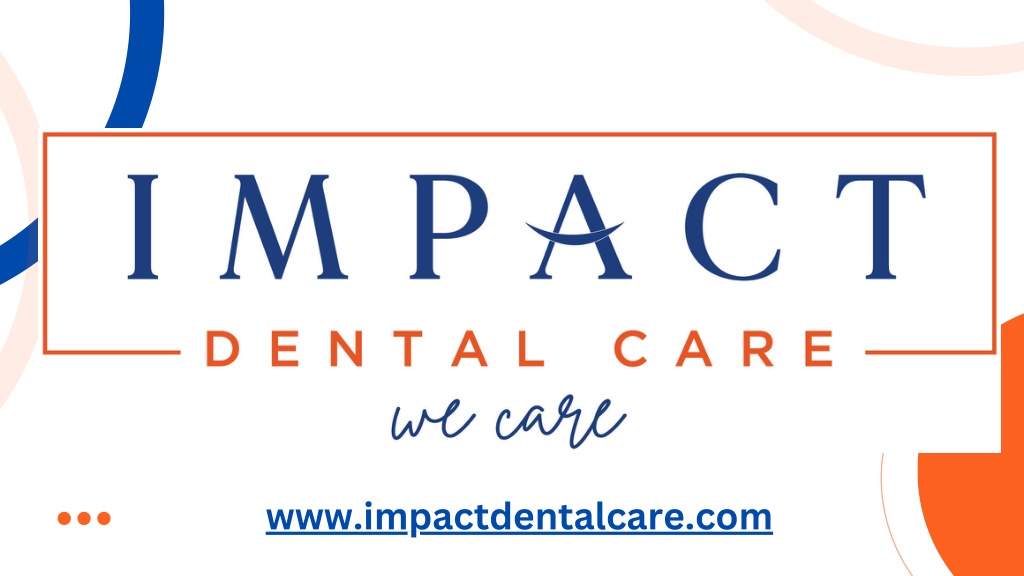
How a General Dentist Can Help Prevent Dental Problems
Impact Dental Care's mission is to enhance our patients' oral health and well-being by equipping them with high-quality, compassionate, and personalized general dental services. We seek to ultimately affect our community by encouraging the significance of good oral hygiene and making dental care affordable for all. Our team is earmarked to deliver excellent patient care through constant education, state-of-the-art technology, and a dedication to ethical practices.
Uploaded on | 8 Views
How a General Dentist Can Help Prevent Dental Problems
PowerPoint presentation about 'How a General Dentist Can Help Prevent Dental Problems'. This presentation describes the topic on Impact Dental Care's mission is to enhance our patients' oral health and well-being by equipping them with high-quality, compassionate, and personalized general dental services. We seek to ultimately affect our community by encouraging the significance of good oral hygiene and making dental care affordable for all. Our team is earmarked to deliver excellent patient care through constant education, state-of-the-art technology, and a dedication to ethical practices.. Download this presentation absolutely free.
Presentation Transcript
How a General Dentist Can Help Prevent Dental Problems Good oral health is crucial for general well-being, and routine visits to a general dentist are vital in attaining this objective. Beyond just restoring cavities and handling toothaches, Family Dentist in Stafford, provides preventative care to help patients avoid dental issues before they happen. Comprehensive Oral Examinations Regular check-ups: Preventative care is a crucial feature of every general dental examination performed by a general dentist, aiming to evaluate the current dental health and oral infection status.
Detection of early signs: Thanks to thorough examinations, drugs in dental procedures can notice some teeth defects, such as erosion, gum infection, and oral cancer, at the early stages. X-rays: Dentists can use X-ray tools and other diagnostic methods to spot concealed problems that may be unrecognizable during a visual examination. Professional Cleanings Plaque and tartar removal: Routine professional cleanings clear oral plaque and tartar, thus balancing the risk of cavities and gum disease. Reach inaccessible areas: Dentists utilize specific tools to clean the harder-to-reach places that routine cleaning would not reach. Even the best dental hygiene practice can only partially attain the same level of oral hygiene acquired through professional cleaning.
Polishing: Common abrasions, like proficient cleanings, also include teeth brushing, which equips a smooth surface to which plaque can't stick as readily. Preventive Treatments Fluoride applications: Fluoride therapies build enamel's deterioration resistance and reduce the chances of cavities forming. Dental sealants: Sealants are thin, protecting barriers applied to the chewing sections of molars to control bacteria and meal particles from getting trapped in the grooves. Custom mouthguards: Conversely, dentists are equipped with tools to fit mouthguards to save teeth from injury during sports or from teeth grinding at night. Early Intervention Treatment of dental issues in their infancy: A general dentist is a person who works with dental problems, seeking to identify them at the first stage so that they do not get worse and need more extensive treatment. Minor restorations: Fillings and simple restorations of beginning decay in the early stages mean a small and medium-sized dental problem can be easily avoided and will not turn into a root canal or a tooth extraction.
Periodontal Care Periodontal Care Gum disease prevention: General dentists provide preventive care, which helps maintain healthy gums. The gum problems they stop are the ones that may progress to become the full-blown ones. Scaling and root planing: If a patient already has the initial symptoms of periodontal disease, dental professionals perform scaling and cleaning the roots of teeth to clean and remove the bacteria deeply below the gum line. Maintenance of periodontal health: Frequent cleaning sessions and examinations are usually beneficial in evaluating the status of one's gums and decreasing the risk of developing periodontal disease. Monitoring Oral Health Changes Tracking changes over time: The general oral care specialist should monitor changes in oral health from one visit to another. Early intervention or treatment is possible during these visits if any issues arise.
Oral cancer screenings: During oral cancer screenings, dentists routinely check during the regular examination to detect any questionable oral lesions and other unusual structures. Referral to specialists: If the situation requires it, the general dentist will contact other specialists and make the necessary referrals for further assessments and treatments. Patient Education and Counseling Oral health habits: Dentists educate their patients on the significance of the fact and recommend some techniques of caring for their oral health based on individual needs, which is very important. Lifestyle factors: During their visits, dentists talk to their patients about habits such as smoking, intake, and stress management, which can be very risky for one's oral health, and give advice on how to be more careful. Risk factors: Dentists identify any dental problems associated with patients' risk factors, such as inherent disposition, medical conditions, and medication use, and offer advice on strategies to avert risks.
Nutritional Counseling Impact of diet on oral health: Dentists educate their patients on the association between food and oral health, teaching them that food options can save them from dental issues or even induce them. Sugar consumption: Dentists contend that limiting sugar intake whenever probable is critical, and the best drinking and eating options lower the risk of tooth erosion and gum disease. Calcium and vitamin D: General dentists in Stafford emphasize that calcium and vitamin D are necessary for the strong development of teeth and bones. Therefore, they can suggest either supplements or diets packed with these nutrients. Management of Dental Anxiety Relaxation techniques: Dentists also provide rehearsed methods that help patients with anxiety relax during dental appointments. For example, they use deep breathing exercises and listen to music. Sedation options: Patients with severe dental anxiety, in an attempt to grant them better comfort during treatments, may, under the scrutiny of dentists, be given options like laughing gas nitrous oxide or oral sedatives. Communication and trust-building: Dentists emphasize clear understanding, building a stake in patients' fears, and creating a relaxed clinical experience.
Contact Details +1 703-952-6600 Phone : 9439 Lorton Market St, Lorton, VA, United States, Virginia Address : Lorton@ImpactDentalCare.com Email : www.impactdentalcare.com Website: Thank you

